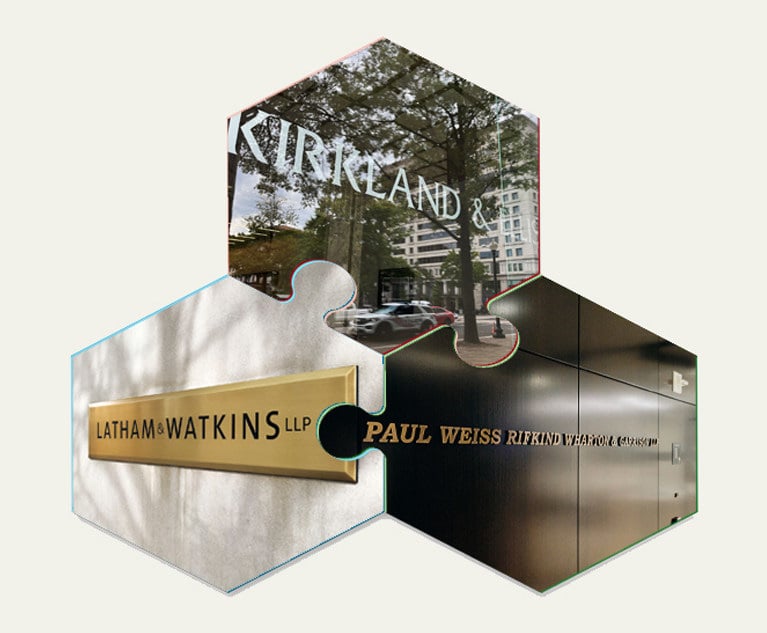Becoming a Trusted Adviser in the Age of Disruption
In a world changing rapidly for clients, law firms must find ways to adapt their own practices to keep up.
September 28, 2018 at 02:52 PM
7 minute read

There are many conversations about how the legal industry has adapted—or failed to adapt—to the various challenges and disruptions it faces. Lawyers' own adaptations have been explored considerably less, as has the topic of how well firms have prepared them to adapt. There are at least a few fascinating but under-explored questions in this area that deserve far more attention:
- What does a lawyer need to understand to be a trusted adviser to corporate clients surfing the waves of change in an age of disruption?
- How does the very nature of the legal profession—smart, well-educated, experienced professionals managing known risks based on precedent and experience—sync with a world where the businesses they are counseling are rapidly shapeshifting or disappearing?
- Where does expertise of any sort fit in a completely new world emerging from technological advances as varied as artificial intelligence, the Internet of Things, Big Data, machine learning, space-age materials, robotics, 3-D printing, and every other fantastical advance that is going to utterly reshape our world?
Becoming “The Trusted Adviser” to clients, famously described in the book of the same name published in 2000 by David Maister, Charles Gree, and Robert Galford, has been the perceived sine qua non for lawyer success for at least the past two decades. But given the degree of divergence between the fundamental conservatism of the legal industry and the dynamism that its clients must exhibit to survive in the digital age, one must at least question whether most lawyers are constitutionally capable of truly serving in the trusted adviser role. At a minimum, expectations around what it means to be a trusted adviser need to be updated.
If you question this proposition, ask yourself: Despite technological advances, what has fundamentally changed in the legal profession in the last 20 years?
The structure of the firm? Some firms are tinkering around the edges, and a few have dared to break the mold, but the overwhelming majority exhibit very little give on guild-like restrictions around firm ownership, which is the ultimate barrier to firm and industry transformation.
The path to partner? There's better discipline around standards for sure, but otherwise very little change.
The compensation model? It's still highly individualistic and focused primarily on top-line revenue in most firms.
The billing structure? There's been some increase in alternative fee arrangements, but most firms remain fundamentally wedded to the billable hour.
We are hard-pressed to name anything about the business itself that has undergone complete transformation. And yet, our clients must adopt new technologies and strategies, and have no choice but to change how, when, where and with whom they do business.
To ask the question more bluntly, how can a lawyer be a trusted adviser to clients facing waves of disruption if their own law firm, at best, drags its feet at even considering reorganization, or, at worst, stubbornly refuses to consider new ways of organizing in a digital age? Why would we assume that everything in the world is going to change except us?
Some firms—but not enough—and a growing number of legal entrepreneurs are making attempts to redefine and re-imagine how legal services get delivered. Some noted examples have included:
- Riverview Law (now owned by Ernst & Young) Elevate, and other alternative legal service providers are capturing ever greater shares of the market for managed legal services. Valorem's recent joint venture with Elevate creating ElevateNext expands the model to offer additional levels of service capability.
- The Big Four themselves are increasingly leveraging their brands and skills around managing sophisticated knowledge work to expand to capture a major share of legal spend.
- While perhaps less dramatic, some traditional law firms, from smaller firms like Levenfeld Pearlstein to larger ones, such as Dentons, are systematically rethinking how they deliver legal services and focusing on improving the client value proposition as well as the internal firm environment. These may not be full redesign efforts, but nevertheless they are challenging themselves to build something different. Others are putting real efforts into legal project management, process improvement, and various technological investments.
Too many traditional firms, including many that have made intentional efforts to improve client service, have made few if any efforts to rethink the organizational structures (governance, partnership, management) and key systems (compensation, promotion, work allocation, KPI tracking) in their firms in ways that would force their partners to behave materially different. Equally important, many senior lawyers—the classic trusted advisers—are themselves highly resistant to change and, frankly, the primary beneficiaries of the status quo in most firms. How can a lawyer be simultaneously resistant to change in their own professional world, and an appropriate adviser to a client desperately seeking to manage in spite of the global shockwaves pounding industry after industry at an ever-increasing pace? While not all firms or all partners fall into these patterns, many do. And that poses a challenge.
What skills and capabilities would a trusted adviser really need to have to be effective in the age of disruption? The fundamental role of a trusted adviser must be helping their clients get ahead of disruption. This means working with them in highly sophisticated ways to anticipate changes that will put pressure on their businesses; supporting them in making bold and aggressive moves in new directions; enabling them to speed up coordinated responses to challenges and opportunities; and facilitating their ability to create productive new relationships within their ecosystems instead of protecting the walls of their citadel.
What might a firm look like that was well positioned to create trusted advisers in the age of disruption?
- First, the firm itself would affirmatively embrace disruption and change and be actively focused on remaking its own business model to adapt to the needs of the current world. Some are doing this, as aggressively as they can, while others are barely doing what they have to just to hold on.
- Second, the firm would be intensely focused on creating the knowledge and the cultural dynamic needed to thrive in the age of disruption, including building new approaches to compensation, teamwork, client interaction, continuous learning and talent selection and management.
- Third, the firm would be aggressively rethinking service delivery models, pricing models and other points of contact with the client to create far more integrated partnerships with their most important clients.
- Finally, the firm would rethink its management and governance models to better mirror those of clients, while simultaneously supporting greater resilience and reinvention capability.
The skills of the lawyer will always reflect the organizational skills of the firm, and it will be hard to build the skills of a trusted adviser in the age of disruption inside an organization that, consciously or not, resists those forces. In the end, the most successful firms will be those that aggressively position themselves to help their clients be successful in theses increasingly challenging times.
Where does your firm stand? Are you creating the trusted advisers of the future?
Joseph Altonji is a founding principal of LawVision and has spent over 30 years consulting for law firms. Kate Sweetman, co-founder of SweetmanCragun, consults on leadership and culture issues globally.
This content has been archived. It is available through our partners, LexisNexis® and Bloomberg Law.
To view this content, please continue to their sites.
Not a Lexis Subscriber?
Subscribe Now
Not a Bloomberg Law Subscriber?
Subscribe Now
NOT FOR REPRINT
© 2025 ALM Global, LLC, All Rights Reserved. Request academic re-use from www.copyright.com. All other uses, submit a request to [email protected]. For more information visit Asset & Logo Licensing.
You Might Like
View All

Letter from Asia: As American Firms Retreat, Will Loyal UK Firms Regain Market Share In Asia?


Change Is Coming With the New Trump Era. For Big Law, Change Is Already Here
6 minute readTrending Stories
- 1ACC CLO Survey Waves Warning Flags for Boards
- 2States Accuse Trump of Thwarting Court's Funding Restoration Order
- 3Microsoft Becomes Latest Tech Company to Face Claims of Stealing Marketing Commissions From Influencers
- 4Coral Gables Attorney Busted for Stalking Lawyer
- 5Trump's DOJ Delays Releasing Jan. 6 FBI Agents List Under Consent Order
Who Got The Work
J. Brugh Lower of Gibbons has entered an appearance for industrial equipment supplier Devco Corporation in a pending trademark infringement lawsuit. The suit, accusing the defendant of selling knock-off Graco products, was filed Dec. 18 in New Jersey District Court by Rivkin Radler on behalf of Graco Inc. and Graco Minnesota. The case, assigned to U.S. District Judge Zahid N. Quraishi, is 3:24-cv-11294, Graco Inc. et al v. Devco Corporation.
Who Got The Work
Rebecca Maller-Stein and Kent A. Yalowitz of Arnold & Porter Kaye Scholer have entered their appearances for Hanaco Venture Capital and its executives, Lior Prosor and David Frankel, in a pending securities lawsuit. The action, filed on Dec. 24 in New York Southern District Court by Zell, Aron & Co. on behalf of Goldeneye Advisors, accuses the defendants of negligently and fraudulently managing the plaintiff's $1 million investment. The case, assigned to U.S. District Judge Vernon S. Broderick, is 1:24-cv-09918, Goldeneye Advisors, LLC v. Hanaco Venture Capital, Ltd. et al.
Who Got The Work
Attorneys from A&O Shearman has stepped in as defense counsel for Toronto-Dominion Bank and other defendants in a pending securities class action. The suit, filed Dec. 11 in New York Southern District Court by Bleichmar Fonti & Auld, accuses the defendants of concealing the bank's 'pervasive' deficiencies in regards to its compliance with the Bank Secrecy Act and the quality of its anti-money laundering controls. The case, assigned to U.S. District Judge Arun Subramanian, is 1:24-cv-09445, Gonzalez v. The Toronto-Dominion Bank et al.
Who Got The Work
Crown Castle International, a Pennsylvania company providing shared communications infrastructure, has turned to Luke D. Wolf of Gordon Rees Scully Mansukhani to fend off a pending breach-of-contract lawsuit. The court action, filed Nov. 25 in Michigan Eastern District Court by Hooper Hathaway PC on behalf of The Town Residences LLC, accuses Crown Castle of failing to transfer approximately $30,000 in utility payments from T-Mobile in breach of a roof-top lease and assignment agreement. The case, assigned to U.S. District Judge Susan K. Declercq, is 2:24-cv-13131, The Town Residences LLC v. T-Mobile US, Inc. et al.
Who Got The Work
Wilfred P. Coronato and Daniel M. Schwartz of McCarter & English have stepped in as defense counsel to Electrolux Home Products Inc. in a pending product liability lawsuit. The court action, filed Nov. 26 in New York Eastern District Court by Poulos Lopiccolo PC and Nagel Rice LLP on behalf of David Stern, alleges that the defendant's refrigerators’ drawers and shelving repeatedly break and fall apart within months after purchase. The case, assigned to U.S. District Judge Joan M. Azrack, is 2:24-cv-08204, Stern v. Electrolux Home Products, Inc.
Featured Firms
Law Offices of Gary Martin Hays & Associates, P.C.
(470) 294-1674
Law Offices of Mark E. Salomone
(857) 444-6468
Smith & Hassler
(713) 739-1250










